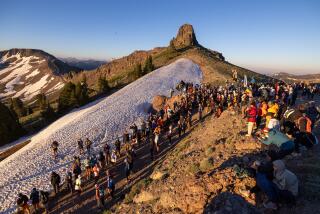Firms That Run Races Find Field Is Crowded
- Share via
The computer printout said the 60-year-old woman had easily won her age bracket in the footrace. But the pace she had set seemed too good to be true.
It was. The woman had been unable to attend the race, and rather than waste her prepaid registration, she innocently gave the computer-coded tag to a young friend. “The time was a little fast for a 60-year-old woman, and we should have picked that up,” recalled Dennis L. Ikenberry, a co-founder of Race Central, a Rialto firm that managed the race.
Runners who exchange jersey numbers are just one of the glitches confronted by Ikenberry’s company, one of at least 50 for-profit firms across the country that manage or organize road races on behalf of corporations and charities. Other foul-ups include volunteers who do not show up, clumps of runners crossing the finish line all at once thereby making accurate times difficult to record, and shortages of portable toilets.
Yet such adversity has not discouraged the avid runners who typically start such companies. Often begun as part-time ventures, the firms proliferated so quickly in the early 1980s that the field became badly overcrowded, said Philip B. Stewart, editor and publisher of Road Race Management, a monthly newsletter based in Arlington, Va. “Over the last few years, there’s been something of a shakeout. . . . There’s just a lot of competition.”
Pricing Pressure
Road race companies come in two breeds, though considerable overlap occurs. Race promoters typically attend to designing and distributing leaflets, placing advertisements in magazines and newspapers, mapping out a route, buying plaques and trophies, arranging for nurses and doctors, obtaining necessary city permits and hiring off-duty police.
The race promotion business is overcrowded and suffers pricing pressure from corporate sponsors whose special events employees can often handle much of the same work at low cost, said Bradley R. Malamud of Professional Road Race Organizers in Los Angeles. “There’s really no money in this. . . . Most people do something else on the side.”
Finish line companies, which often enjoy virtual local monopolies, seem to fare better. Their main job is timing the runners--a particularly tough task in short races when runners all pour across the finish line within a few minutes of each other. The Heart of the City 5-kilometer run in downtown Los Angeles on June 29 was especially difficult to manage, Ikenberry said. “You have basically 3,000 runners coming in 20 minutes.”
Obtaining precise times for all those runners without hiring hundreds of timers with stopwatches requires a specially programmed personal computer. An identifying tag with a computer bar code is taken from the bottom of each runner’s number in the order in which athletes finished. Then the tags are matched by computer with the separately recorded times at which runners crossed the finish line, so that the first tag is paired with the fastest time, the second tag with the second fastest time, and so forth.
Finish line companies require some equipment--Race Central has 12 computers, a bus, a motor home and a van--and usually work most of the races in their city, Stewart said. “You get one group in each city and how large or small they are depends on how active the running is in that city. . . . They have pretty much complete control over what goes on in that city.”
Race promotion and finish line fees vary. Promoters can charge the corporate sponsors of races anywhere from $2,000 to $15,000 plus expenses to set up an event, said Malamud.
Finish line fees vary by the number of runners and size of the race. William S. Michaels, a Denver entrepreneur who promotes races and manages finish lines, said he charges about $750 plus $1 per runner to handle a 1,000-athlete finish line with computer timing and ranking. His company handles 25 to 30 races a year.
Companies that fail to deliver promised volunteers are the biggest problem for finish line companies, Ikenberry said. Sometimes the only answer is dragooning spectators and training them on the spot. “We literally pull them out of the crowd,” he said.
More to Read
Sign up for Essential California
The most important California stories and recommendations in your inbox every morning.
You may occasionally receive promotional content from the Los Angeles Times.













